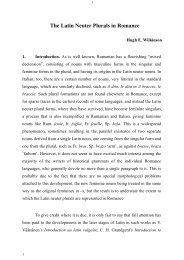THE STRONG PERFECTS IN THE ROMANCE ... - Page ON
THE STRONG PERFECTS IN THE ROMANCE ... - Page ON
THE STRONG PERFECTS IN THE ROMANCE ... - Page ON
Create successful ePaper yourself
Turn your PDF publications into a flip-book with our unique Google optimized e-Paper software.
detenissemus, Italy, 10th c.), volerit (and volestis), nolerit, poterit,<br />
poterint, and possibly also poterunt, poterant (these, and poterit,<br />
confusable with the future and imperfect). Besides these, there are<br />
the parallel forms nexi and nexui, and contexit, conteximus beside<br />
texui, of which more later (§13). Of these, tenerit, volerit and poterit<br />
(Lex Rom. Utin., 9th c.) and similar forms are of especial interest<br />
because some of the forms of many of the later languages point to<br />
*tēni, *voli, *poti. It will also be seen that as *potebo, *potebam (cf.<br />
potibat, in Tardif’s Cartons des Rois, M. & T., p. 200) took over the<br />
roles of potero and poteram, these latter (and perhaps potessem,<br />
quoted by Buck as “rare”, cf. pre-classical potisset, potesse) could<br />
have survived as alternatives to potuero, potueram and potuissem.<br />
Anyway, all in all, we have here some slight evidence of -ui forms<br />
losing their u, though under what conditions is not clear. If we accept<br />
the evidence of OLat. monerim, moneris, all these must serve as<br />
examples to corroborate Dardel’s theory.<br />
Dardel finds stronger evidence on which to base his theory<br />
in another class of verbs ― those which originally had no perfect<br />
suffix and came to adopt the u. These can be divided into various<br />
categories. Firstly there are those mentioned just now which had -vi<br />
in classical Latin, where the v probably stood for a doubled<br />
consonant, and so we have later pabuit, expabui for pāvi (= *pavvi),<br />
and ferbui for fervi; we may also mention here the trisyllabic solui<br />
found for solvi in poetry, though the more typical late forms for this<br />
verb have s, as absolsi, solserit, solserunt, transolsisse. In the next<br />
class, -ui is found added to the present stem to replace an -ui or -vi<br />
perfect differently formed; so we have sapui, saupisset (Lex Rom.<br />
Utin.), (con)terui, terueris, atteruisse, linuit, sinui, sinuerunt,<br />
12









